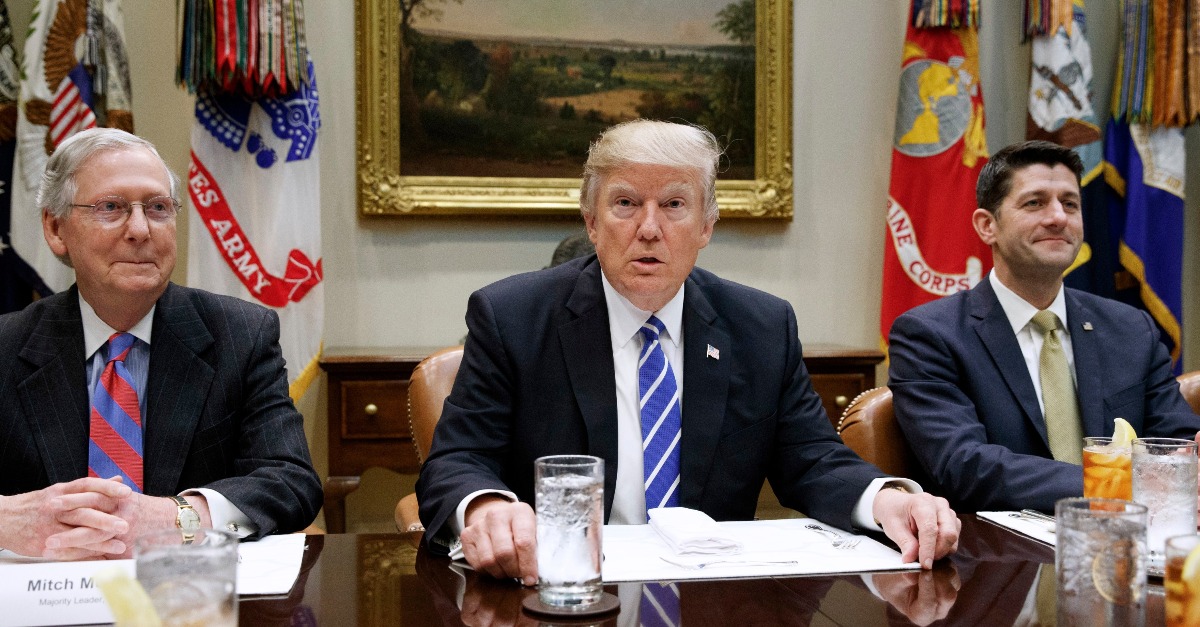Conservatives looking for someone to blame after the failure to repeal Obamacare have settled on Senate Majority Leader Mitch McConnell. On Wednesday, their efforts were joined by President Donald Trump’s adviser Dan Scavino Jr. and then by the president himself.
Videos by Rare
“More excuses. [Senate Majority Leader Mitch McConnell] must have needed another 4 years — in addition to the 7 years — to repeal and replace Obamacare,” Scavino tweeted early Wednesday morning. He added in another tweet the familiar refrain of “drain the swamp.”
Trump chimed in “Senator Mitch McConnell said I had ‘excessive expectations,’ but I don’t think so. After 7 years of hearing Repeal & Replace, why not done?”
Trump revisited this theme Thursday, tweeting “Can you believe that Mitch McConnell, who has screamed Repeal & Replace for 7 years, couldn’t get it done.”
Trump was responding to McConnell’s comments at a Rotary Club in Kentucky, where the Senate leader said “Our new president has of course not been in this line of work before and I think had excessive expectations about how quickly things happen in the democratic process.”
Make no mistake, this kind of public infighting is very harmful to the Republican Party. It communicates that the GOP is solely to blame for the failure of “skinny” repeal, a dangerous message for a party leader to send.
RELATED: By blowing it on health reform, Republicans have ceded fixing Obamacare to the Democrats
It also shows a lack of understanding of Senate procedure. When Congress returns from recess, they will need to revisit Obamacare repeal — and the White House should be strongly advocating that they do so as soon as possible. This kind of public squabbling only hampers those efforts towards unity.
Still the question must nonetheless be asked: Who is really to blame for the failure of “skinny” repeal? Should McConnell have done things differently? Could he in the future?
“Skinny” repeal was supposed to be the narrowest terms under which Republicans could still garner 50 votes. It’s worth pointing out that 49 out of 52 Republicans voted with McConnell on “skinny” repeal. He lost two senators who were never going to vote with Republicans, Lisa Murkowski and Susan Collins, and then John McCain, who surprised everyone with his “no” vote.
Some commentators have postulated that the Republican conference should have more discipline, and that it is McConnell’s fault the party operates more like a governing coalition than a unified front. But such claims betray a misunderstanding of a fundamental truth within the Senate: senators are individually very powerful.
Could McConnell have forced the hands of Collins and Murkowski and made them vote according to what the party wants? Theoretically, he could have taken away Murkowski’s powerful chairmanship of the Senate Committee on Energy and Natural Resources, but that didn’t work out so well for John Boehner when he tossed a couple conservatives off of their committees: the base was enraged and the rebellions continued. And the Senate operates differently from the House. Senators are individually given committee ranks based on seniority, rather than as a reward from the leader. And McConnell has never punished senators in this way for voting against him, so this would be a break from precedent.
RELATED: Shame on the spineless Republicans who wouldn’t vote for skinny repeal
Another option might have been to fund a primary challenger against one of the nominal Republicans like Collins or Murkowski. But backing a primary challenger against a seated Republican is pretty distasteful, and it might not even work. As recently as 2010, Murkowski wasn’t even the Republican nominee in Alaska; both McConnell and the National Republican Senatorial Committee endorsed conservative challenger Joe Miller against her. She survived Miller’s insurgency and could yet survive another.
It’s possible that McConnell could have done more to move repeal forward, particularly with the timing of the votes and the transparency of the process, but none of that would have guaranteed that rogue senators would have played ball. The White House has taken a hands-off approach to legislative timing, reportedly, and in hindsight that also appears a doomed strategy.
So there’s blame to go around. But as insurers move out of Obamacare markets and deductibles and premiums skyrocket, it’s a huge mistake for Republicans to turn the media’s attention to infighting and backbiting over strategy. Regardless of mistakes that were made, the consequences for the GOP of playing out a public blame game will be disastrous. Their focus needs to remain on repeal.



